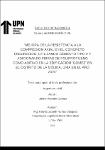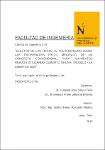Mostrar el registro sencillo del ítem
Mejora de la resistencia a la compresión axial en el concreto endurecido, utilizando cemento tipo V y adicionando fibras de polipropileno como aditivo en la edificación “Gómez” en el distrito de la Molina, Lima en el año 2023
| dc.contributor.advisor | Núñez Vásquez, Kely Elizabeth | |
| dc.contributor.author | Arevalo Gomez, Jaime | |
| dc.date.accessioned | 2023-12-12T23:46:11Z | |
| dc.date.available | 2023-12-12T23:46:11Z | |
| dc.date.issued | 2023-10-02 | |
| dc.identifier.citation | Arevalo, J. (2023). Mejora de la resistencia a la compresión axial en el concreto endurecido, utilizando cemento tipo V y adicionando fibras de polipropileno como aditivo en la edificación “Gómez” en el distrito de la Molina, Lima en el año 2023 [Tesis de licenciatura, Universidad Privada del Norte]. Repositorio de la Universidad Privada del Norte. https://hdl.handle.net/11537/35364 | es_PE |
| dc.identifier.other | 620.1124 AREV 2023 | es_PE |
| dc.identifier.uri | https://hdl.handle.net/11537/35364 | |
| dc.description.abstract | La costa peruana está presentando una gran expansión de centros urbanos, los cuales en ciertas zonas donde se trabajó la cosecha o se estuvo en una constante exposición al mar peruano, sufrieron cambios en su composición, siendo esta la presencia de sulfatos entre otros componentes químicos que afectan directamente a las propiedades del concreto, teniendo que utilizar en ciertos casos diferentes tipos de cemento o aditivos para que el concreto resultante sea apropiado para las condiciones en las que se encuentra. La investigación presentada, tiene como objetivo principal mejorar la resistencia a la compresión axial utilizando fibras de polipropileno para una resistencia de 280 kg/cm2, utilizando cemento tipo V, incorporando el 5% y 10% del peso del agregado fino por fibras de polipropileno, siguiendo el procedimiento establecido por el comité ACI 211 para el diseño de mezcla, siendo este un tipo de investigación experimental y de metodología cuantitativa, teniendo como técnica la observación directa e instrumentos las fichas de recolección de datos de laboratorio y hojas de cálculo. Se determinaron las propiedades de los agregados siguiendo la norma técnica peruana, para luego determinar el diseño de mezcla por utilizar, en la presente investigación se consideró ensayos a los 7, 14 y 28 días, teniendo un total de 27 probetas como muestra, obteniendo como resultados a los 28 días un promedio de: 358 kg/cm2, 308 kg/cm2 y 162 kg/m2 para las mezclas con 0%, 5% y 10% respectivamente, dando como resultado que el concreto con fibra de polipropileno en estas proporciones obtuvo una menor resistencia a la compresión comparándola con la mezcla patrón del concreto, disminuyendo en un 13.97% para 5% y 54.79% para 10%, concluyendo que la mezcla con fibras de polipropileno no mejora su resistencia a la compresión cuando se incorporó el 5% y el 10% del peso del agregado fino por fibras de polipropileno, concluyendo que la resistencia no mejora para las proporciones de 5% y 10% en comparación a la mezcla patrón, rechazando la hipótesis planteada y aceptando la hipótesis nula. | es_PE |
| dc.description.abstract | The Peruvian coast is experiencing a significant expansion of urban centers, which in certain areas where harvesting was carried out or there was constant exposure to the Peruvian sea, underwent changes in their composition, specifically the presence of sulfates and other chemical components that directly affect the properties of concrete. In certain cases, different types of cement or additives are required to ensure that the resulting concrete is suitable for the prevailing conditions. The main objective of the presented research is to improve axial compressive strength by using polypropylene fibers for a strength of 280 kg/cm2, with the use of Type V cement. The research incorporates 5% and 10% of the weight of fine aggregate as polypropylene fibers, following the procedure established by the ACI 211 committee for mix design. The research is of an experimental nature and employs quantitative methodology, with direct observation as the technique and laboratory data collection sheets and spreadsheets as instruments. The properties of the aggregates were determined following the Peruvian technical standard, and based on the results, the mix design to be used was determined. The research considered testing at 7, 14, and 28 days, with a total of 27 samples. The results at 28 days showed an average strength of 358 kg/cm2, 308 kg/cm2, and 162 kg/m2 for the mixes with 0%, 5%, and 10% polypropylene fibers, respectively. It was observed that the concrete with polypropylene fibers in these proportions had lower compressive strength compared to the standard concrete mix, decreasing by 13.97% for 5% and 54.79% for 10%. Thus, it can be concluded that the inclusion of 5% and 10% of the weight of fine aggregate as polypropylene fibers does not improve the compressive strength of the concrete. The research rejects the proposed hypothesis and accepts the null hypothesis. | es_PE |
| dc.description.uri | Tesis | es_PE |
| dc.format | application/pdf | es_PE |
| dc.format | application/msword | es_PE |
| dc.language.iso | spa | es_PE |
| dc.publisher | Universidad Privada del Norte | es_PE |
| dc.rights | info:eu-repo/semantics/restrictedAccess | es_PE |
| dc.source | Universidad Privada del Norte | es_PE |
| dc.source | Repositorio Institucional - UPN | es_PE |
| dc.subject | Resistencia a la compresión | es_PE |
| dc.subject | Concreto | es_PE |
| dc.subject | Mecánica de sólidos | es_PE |
| dc.subject | Agregado fino | es_PE |
| dc.subject | Agregado grueso | es_PE |
| dc.subject | Diseño de mezcla | es_PE |
| dc.subject | Polipropileno | es_PE |
| dc.subject | Fine aggregate | es_PE |
| dc.subject | Coarse aggregate | es_PE |
| dc.subject | Concrete | es_PE |
| dc.subject | Mix design | es_PE |
| dc.subject | Polypropylene | es_PE |
| dc.subject | Compressive strength | es_PE |
| dc.title | Mejora de la resistencia a la compresión axial en el concreto endurecido, utilizando cemento tipo V y adicionando fibras de polipropileno como aditivo en la edificación “Gómez” en el distrito de la Molina, Lima en el año 2023 | es_PE |
| dc.type | info:eu-repo/semantics/bachelorThesis | es_PE |
| thesis.degree.grantor | Universidad Privada del Norte. Facultad de Ingeniería | es_PE |
| thesis.degree.level | Título Profesional | es_PE |
| thesis.degree.discipline | Ingeniería Civil | es_PE |
| thesis.degree.name | Ingeniero Civil | es_PE |
| dc.publisher.country | PE | es_PE |
| dc.subject.ocde | https://purl.org/pe-repo/ocde/ford#2.01.01 | es_PE |
| thesis.degree.program | Pregrado | es_PE |
| dc.description.sede | Breña | es_PE |
| renati.advisor.dni | 42679441 | |
| renati.advisor.orcid | https://orcid.org/0000-0001-7846-2510 | es_PE |
| renati.author.dni | 71203144 | |
| renati.discipline | 732016 | es_PE |
| renati.juror | Neyra Torres, José Luis | |
| renati.juror | Vereau Miranda, Edmundo | |
| renati.juror | Marlon Araujo, Cristian | |
| renati.level | http://purl.org/pe-repo/renati/level#tituloProfesional | es_PE |
| renati.type | http://purl.org/pe-repo/renati/type#tesis | es_PE |
| dc.relation.conformsto | 4% | es_PE |
Ficheros en el ítem
Este ítem aparece en la(s) siguiente(s) colección(ones)
-
Tesis [1449]










